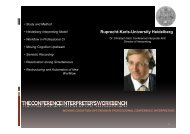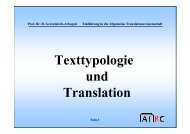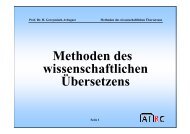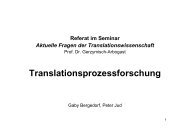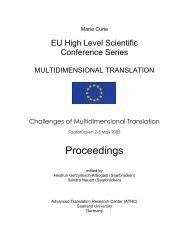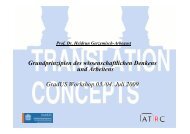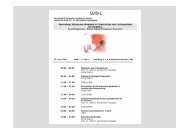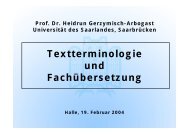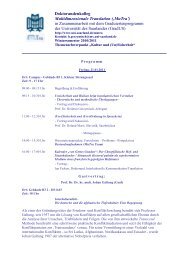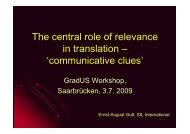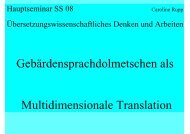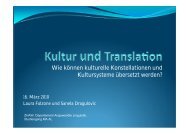Proceedings - Translation Concepts
Proceedings - Translation Concepts
Proceedings - Translation Concepts
Create successful ePaper yourself
Turn your PDF publications into a flip-book with our unique Google optimized e-Paper software.
6 The accent of the voice<br />
MuTra 2006 – Audiovisual <strong>Translation</strong> Scenarios: Conference <strong>Proceedings</strong><br />
Pilar Orero<br />
Linked with the quality of voice and with a higher – marginally academic - attention in the<br />
studies on Audiovisual <strong>Translation</strong> are Fawcett’s (1983: 187) and Pönniö’s (1995: 304)<br />
observations. They question the adequacy of “a documentary on African tribal life with voiceovers<br />
in impeccable “Oxford” English” and comment on the use of accents when delivering<br />
the voice-over.<br />
It would be interesting to look at other countries and find out if voice-over is delivered<br />
by a voice-talent –as is the case of documentaries – or by a journalist or by the translators<br />
(Abusalem 2006; Ali 2006). In Spain and Catalonia voice-over translations are read by voicetalents<br />
or journalists who are native Catalan or Castilian speakers, hence producing the<br />
paradox of wanting to give the impression of authenticity while at the same time the perfect<br />
delivery in Catalan or Spanish will show that the person who speaks in a foreign language is<br />
not the same as the one who is doing the locution.<br />
There is an interesting case in Spanish TV in the program Redes on La 2. In each<br />
program there is an interview with an international scientific personality. The director and<br />
presenter Eduard Punset does the interview in English, and the material is then sent to be<br />
translated. Once the translation is done, and editing is in order (Kelly 2006: 5), Eduard Punset<br />
himself voices in Spanish. The overall effect is that most people think that Punset translates<br />
his own questions, and in some occasions people even believe that the interview is live, and<br />
that there is simultaneous interpretation. This technique is also used at Aljazeera and has been<br />
observed in recent interviews with Russian President Vladimir Putin and the Turkish Prime<br />
Minister - a very illustrative example of Merrin’s explanation of Braudillard’s hyperreality<br />
concept (2001: 198) which is “not unreal but quite the opposite: an excessive semiorealization<br />
of the real” which is in fact more real than the real.<br />
The ability to speak in English and translate himself simultaneously confers upon<br />
Punset the attribute of a media demigod.<br />
In a recent publication Zinovi Zinick (2006: 14), a writer who lends his voice to the<br />
BBC, writes “you create an image of ethnic origin by simulating in English the idiosyncrasies<br />
of the other's original tongue.” This is especially interesting because one has to be English to<br />
have the stereotyped accent of someone French: such as the TV character René played by<br />
Gorden Kaye who impersonated a French accent to portray a French barman in the famous<br />
BBC TV series ‘Allo, ‘Allo (1985) or the infamous character of Manuel played by Andrew<br />
Sachs in Fawlty Towers (1975).<br />
The use of the translator’s voice may also be used as a disclaimer. According to<br />
Darwish (2006: 63) journalists, not translators do most translations, although interpreters and<br />
translators are also expected to do voiceovers. He also mentions (2006: 58) that this is<br />
responsible for the quality of the translations since “given the poor translation skills of most<br />
journalists and translators (as attested by the numerous examples of erroneous translations)<br />
and the lack of structured methodologies in news translation that ensure accuracy, fairness,<br />
truthfulness, objectivity [emphasis in original] and neutrality of reported news and transferred<br />
information through translated documentaries, major violations of these principles are<br />
inevitable.”<br />
The accent of the voice may also imply that an indirect translation has been performed<br />
(Abusalem 2006: 26; Darwish 2006: 63), i.e. that a non-native speaker of English has<br />
translated the text and then delivered it: which again makes us fall into the hyperreality trap.<br />
Indirect translation for voice-over is a common practice in the UK and the Arabic speaking<br />
TV stations (Abusalem 2006 and Darwish 2006). I was often called to translate into English<br />
when there was no written text and the translation had to be done from the screen or from the<br />
tape, as for example in the BBC Radio Programme “The History of Football” where I had to<br />
translate Kubala and Di Stefano.<br />
176



